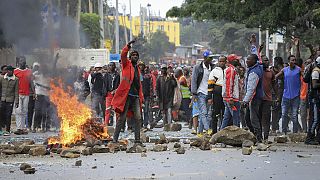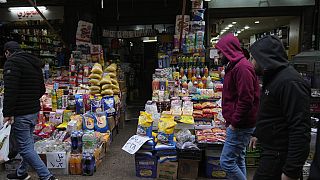Kenya
Kenya is being swamped with waste clothing from other continents, a report by the Changing Markets Foundation claims.
The report, based on findings by the Kenyan environmentalist groups Wildlight and Clean Up Kenya, says that "an overwhelming volume of used-clothing shipped to Kenya is waste synthetic clothing".
While the exporting of plastic waste is restricted under the Basel Convention, a voluntary agreement called the Control of Transboundary Movements of Hazardous Wastes and Their Disposal, a third of the old clothes shipped to Kenya is reported to contain plastic.
Most of the clothes are from the EU, donated to charities after they've already had second or even third hand use.
Less about charity, more about business
According to Clean Up Kenya, the scale of the problem is increasing.
Its founder, Betterman Simidi, says the problem is that the market for second hand clothes has become less about charity and more about big business.
"When these clothes are donated in Europe, the people donating them, the EU citizens, might think that they are doing a good will gesture to poor countries like Kenya but [...] these donations have become a multi million dollar industry,” he says.
Because so many of the clothes are made with synthetic plastic fibres, they take a long time to degrade, heavily impacting the environment by polluting the soil and water sources.
Edward Mungai a sustainability researcher at Strathmore University says the manufacturers should be made legally responsible for the sustainable disposal of their clothes.
"Now for instance they export and forget about it, they need to go one step beyond and probably figure out what to do with those products and in this case you know the synthetic materials probably there should be a ban in terms of what should be exported and what not to be exported because that way then we can deal with the problem that we are having in the south where we are getting second hand things of which only probably 50 percent can be able to be used the rest goes to the landfills," says Mungai.
Illegal imports
The Kenyan Bureau of Standards are struggling to ensure that traders comply with their pre export verification of conformity to standards program (PVoC).
The program is meant to make sure that imports are checked in their countries of origin by third party inspection companies.
The programme has been running since 2005, but Bernard Nguyo, Director of Quality Assurance and Inspection at the Kenya Bureau of Standards says unscrupulous traders take advantage of Kenya's strategic position as a transit country.
He claims they pretend to import clothes for markets in neighbouring countries like Uganda or Sudan and then re-import the clothes back into Kenya through unconventional means.
Nguyo argues the importance of harmonising customs enforcement within the East Africa region as a whole.
Also each shipping container may have 500 bales, making it impractical to inspect every import into Kenya. If an inspection by the private contractor passes, the import is given a certificate which is verified at the port of entry,
But Nguyo agrees the system isn’t fool-proof.
"It is individual businesses that do the sorting, it is individual businesses that do the exportation and these are the businesses that need to realise that in Kenya we have a standard so if they would want to continue trading with Kenya, then they need to conform to that standard. We have begun a program of risk profiling so that any entity that habitually violates our national standard is blacklisted and will not be able to export to this country," says Nguyo.
The Bureau of Standards believes it is imperative to inform Kenyan consumers and dealers about hazardous and illegal imports, thus discouraging demand. Without demand, the traders would then have no market.












02:38
Natural harmony of Uganda's 'Ghost Island' under threat from international tourism
02:05
In Zimbabwe, metal scrap collecting is reducing environmental pollution
01:24
EU to seek tougher measures from Libyan authorities on Mediterranean migrant sea crossings
02:22
Cameroonian marine conservationists trained as scientific divers
00:28
Nairobi hawker shot at close range by police declared brain dead
Go to video
Kenya's Interior minister accuses protesters of coup attempt after deadly demos